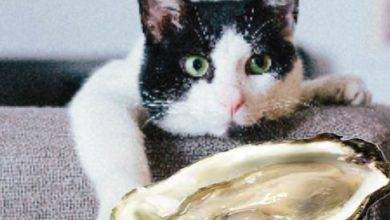Are Mushrooms Safe for Cats to Eat?

Are Mushrooms Safe for Cats to Eat? Mushrooms can be highly toxic to cats and can cause serious health problems, including liver damage and even death.
So, it’s important to be aware of the types of mushrooms that are toxic to cats. Some common toxic mushrooms for cats include Amanita phalloides, Amanita pantherina, and Amanita muscaria. Other mushrooms, such as Gyromitra esculenta and Verpa bohemica, are also highly toxic to cats.
Are Some Mushrooms Safe for Cats to Eat? A Closer Look at Edible Varieties
Now, you might be thinking, “If some mushrooms are toxic, are there any mushrooms that are safe for my cat to eat?” The answer is yes, there are some mushrooms that are safe for cats to eat in moderation. These include commonly cultivated mushrooms such as button, cremini, and portobello mushrooms.
However, it’s important to note that even safe mushrooms should only be fed to your cat in small amounts, as they are not a necessary part of their diet.
Also Read: Does Vinegar Really Stop Cats from Pooping?
Potential Health Risks of Feeding Mushrooms to Cats: What to Watch Out For
Feeding mushrooms to cats can come with potential health risks. Even safe mushrooms can cause digestive upset, including vomiting and diarrhea, if fed in excessive amounts.
Additionally, if your cat ingests toxic mushrooms, it can experience a range of symptoms, including lethargy, loss of appetite, and jaundice. In severe cases, mushroom toxicity can even be fatal. So, it’s important to be vigilant and watch out for any signs of mushroom poisoning in your cat.
Also Read: Why Cats May Attack Pregnant Women
Common Symptoms of Mushroom Toxicity in Cats: Signs to Look For
If your cat ingests toxic mushrooms, it can experience a range of symptoms. These may include vomiting, diarrhea, drooling, difficulty breathing, lethargy, and even seizures. If you notice any of these symptoms in your cat and suspect that they may have ingested mushrooms, it’s important to seek veterinary care right away.
Treating Mushroom Poisoning in Cats: Veterinary Care and Precautions
If your cat has ingested toxic mushrooms, they will require immediate veterinary care. Treatment may include inducing vomiting, administering activated charcoal to absorb any remaining toxins, and providing supportive care such as IV fluids and medication. It’s important to note that there is no specific antidote for mushroom poisoning in cats, so prevention is key.
Can Cats Eat Cooked Mushrooms? Understanding the Differences between Raw Mushrooms
While some cooked mushrooms may be safe for cats to eat in small amounts, it’s important to note that cooking mushrooms changes their composition and nutrient content.
Additionally, seasoning or additives used in cooking mushrooms may not be safe for cats and can cause gastrointestinal upset or other adverse reactions. So, if you do choose to feed your cat cooked mushrooms, it’s best to do so sparingly and under the guidance of your veterinarian.
Also Read: How to Tell If Your Cat Still Has Kittens Inside
Mushroom-Based Cat Food and Treats: Are They Safe and Recommended?
There are commercial cat foods and treats that contain mushrooms as ingredients, and they are marketed as being beneficial for cats. However, it’s important to carefully review the ingredients and consult with your veterinarian before incorporating mushroom-based cat food or treats into your cat’s diet.
Always choose reputable brands and carefully read the labels to ensure that the mushrooms used are safe for cats and in appropriate amounts. Your veterinarian can provide guidance on the suitability of mushroom-based cat food or treats for your specific cat’s dietary needs.
Precautions for Cat Owners: How to Prevent Accidental Mushroom Ingestion
As responsible cat owners, it’s important to take precautions to prevent accidental mushroom ingestion by our furry friends. Here are some tips to keep in mind:
Know the toxic mushrooms: Familiarize yourself with the types of mushrooms that are toxic to cats, such as Amanita species, Gyromitra species, and Verpa species. Avoid allowing your cat to access or ingest these mushrooms.
Keep mushrooms out of reach: If you’re a mushroom enthusiast or have mushrooms in your garden, make sure they are kept out of your cat’s reach. Cats are curious creatures and may be tempted to nibble on mushrooms, so keep them securely stored or fenced off.
Read Also: Can Cat Eat Oyster and its benefit to Cat
Be cautious during walks: If you take your cat for walks or let them roam in an outdoor area, be vigilant about any mushrooms they may encounter. Cats may be curious and may try to eat mushrooms they come across during their outdoor adventures.
Do not rely on visual identification: Identifying toxic mushrooms solely by their appearance can be difficult, as toxic and safe mushrooms can sometimes look similar. Therefore, it’s best to avoid feeding your cat any wild mushrooms, regardless of their appearance.
Consult with a Veterinarian: Best Practices for Feeding Mushrooms to Cats
As with any dietary changes for your cat, it’s always best to consult with your veterinarian. They can provide personalized advice based on your cat’s specific health needs, age, and lifestyle. Your veterinarian can help determine if mushrooms are safe for your cat to eat and in what amounts. They can also provide guidance on any potential risks and precautions to take.
Can cats eat mushrooms from pizza?
First off, when it comes to mushrooms from pizza, it’s generally not recommended to feed them to cats. Pizza toppings can contain other ingredients like onions, garlic, and seasonings that may not be safe for our feline friends. Plus, the cheese and other toppings may not be suitable for their digestion. So, it’s best to skip the pizza treats for your cat.
Are normal mushrooms toxic to cats?
Now, let’s talk about normal mushrooms. While some mushrooms may be safe for cats in small quantities, many types of mushrooms can be toxic to them. Cats have different digestive systems and nutritional needs compared to humans, so it’s important to be cautious. It’s best to avoid feeding cats normal mushrooms or any wild mushrooms to be on the safe side.
Can cats eat mushrooms and onions?
When it comes to mushrooms mixed with onions or garlic, it’s a big no-no for cats. Both onions and garlic belong to the Allium family, and they can be toxic to cats. They contain compounds that can damage a cat’s red blood cells and lead to anemia. Even a small amount of onions or garlic can be harmful to our feline friends, so it’s best to avoid feeding them mushrooms mixed with these ingredients.
Read Also : Why do guinea pigs squeak?
Conclusion
While some mushrooms may be safe for cats to eat in small amounts, it’s crucial to exercise caution and consult with your veterinarian. It’s best to avoid feeding wild mushrooms to your cat altogether to prevent the risk of toxicity.
If you’re considering incorporating mushrooms into your cat’s diet through commercial cat food or treats, always choose reputable brands and carefully read the labels. And remember, prevention is key, so take precautions to keep mushrooms out of your cat’s reach to ensure their health and well-being. Happy cat parenting!





